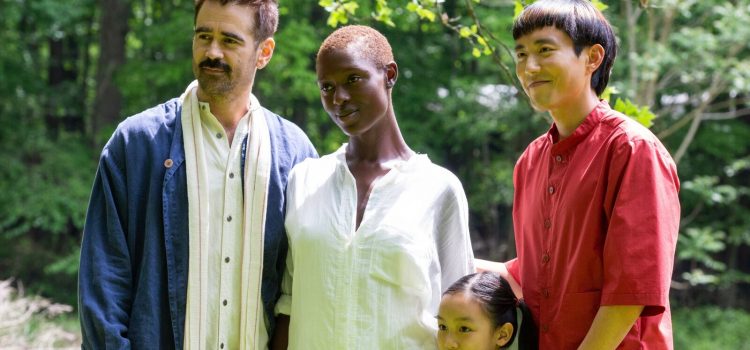By Alex McPherson
Patient, meditative, and pulsing with feeling beneath its calming atmosphere, the latest effort by video-essayist-turned-film-director Kogonada, “After Yang,” poses profound questions in quietly gripping fashion.
The film, based on the short story “Saying Goodbye to Yang” by Alexander Weinstein, is set in an unnamed futuristic city — presumably after a war or natural catastrophe — where slightly heightened technology has permeated daily life, and East Asian stylistic influences abound, cleanly melding the ecological with the manmade.
Everyone speaks in muted, passionless tones. We follow a family encountering a shattering loss. Jake (Colin Farrell) owns a tea shop lacking customers, going about his days with isolated remove. Kyra (Jodie Turner-Smith) is constantly busy as a corporate executive. Neither are as present as they should be with their young adopted Chinese daughter, Mika (Malea Emma Tjandrawidjaja), who spends much more time with Yang (Justin H. Min), a “technosapien” they purchased to help educate Mika about her cultural heritage. Over time, though, shown in flashbacks, Yang becomes less of a “Chinese Fun Fact” distributor for Mika and more of a brother figure, rendering his untimely malfunction all the more traumatic.
Trying to console a distraught Mika, Jake tries to get Yang repaired. Before long, a paranoid mechanic (Ritchie Coster) finds a box within Yang that contains memory clips of what Yang found meaningful while he was online. As Jake views the recordings — thanks to a museum curator (Sarita Choudhury), who provides him the ability to view them in exchange for permission to create an exhibit about Yang’s life — he begins to value Yang on a whole new level while neglecting to tell his wife and child the full truth.
Yang’s memories are visualized as stars comprising a galaxy, within which lie resonant snippets of time Yang chose to preserve. Jake also learns about his own flaws, imperfections, and potential to develop as an aimless entity in search of meaning in our chaotic universe. He eventually encounters a strange woman in Yang’s memories (Haley Lu Richardson), who unearths more of Yang’s secrets.
Although some viewers might find “After Yang” too subtle and ponderous for its own good, part of what makes Kogonada’s film so moving is how gentle it is — letting plot developments unfold with a dreamlike rhythm that percolates into a rich, textured whole upon later reflection.
The opening, however, where the central family competes in an intensive dance competition from their living room, is bursting with infectious energy. The rest of the film’s melancholic tone underscores the void left behind by losing Yang, and a family dynamic that Jake and Kyra have difficulty recapturing. Despite their relative privilege and open, spacious house — with a large tree growing in their central courtyard — they’re missing something crucial and comforting, stuck in a sort of limbo not unlike the confusion Yang feels about his own being.
Indeed, although Yang himself possesses a warmth and compassion that’s instantly endearing, it’s much harder to connect with either Jake or Kyra — especially Jake, who isn’t by any means a bad person, but someone drifting through life not fully appreciating those around him. Farrell gives an incredible, understated performance, where viewers observe — through small, yet meaningful shifts in attitude and behavior — a man reckoning with his own memories, by viewing Yang’s, and recognizing the messy, conflicted entity bubbling beneath his programming.
We don’t spend as much time with Kyra, who wants to tell Mika the truth about Yang’s death and move on, but as the story unfolds, she too recognizes a trapped soul searching for more. “After Yang” also paints an emotionally affecting contrast between Mika’s current despondence and her happiness alongside Yang, who gave her attention lacking from her adoptive parents. Yang himself, basically forced to take on a particular Asian identity sans much free will, is performed expertly by Min, who movingly conveys the android’s heartache and yearning through simple, powerful line delivery and facial expressions.
In terms of visuals, Kogonada infuses “After Yang” with depth that perfectly complements the subject matter. The cinematography by Benjamin Loeb features wide, static shots of this plausible world, conveying the ennui faced by Jake and Kyra with effective chilliness. When watching Yang’s memories play out, “After Yang” takes a more documentary-esque, arty approach reminiscent of Terrence Malick’s films, where we get colorful snippets of the natural world and human connection that gradually form a grander portrait. Additionally, when Jake and Kyra look back on specific conversations with Yang, Kogonada repeats lines of dialogue with different tones and camera angles, illustrating how the simple act of remembering has unmoored them to an extent, adding dimension previously overlooked.
The score, by Aksa Matsumiya and Ryuichi Sakamoto, is at once relaxing and raw, elegiac while also accentuating the eeriness of not truly “understanding” technology, or even our loved ones, or ourselves. Within a world over-reliant on technology, “After Yang” depicts the ways that it can benefit our lives if used properly, and how confronting grief can ultimately prove liberating.
Kogonada’s film isn’t perfect — expository dialogue and simplistic characterizations of certain side characters stand out — but it’s one of 2022’s most thought-provoking films thus far, and one that rewards viewers eager for the unexpected.

“After Yang” is a 2021 American sci-fi drama directed by Kogonada and starring Colin Farrell, Jodie Turner-Smith, Justin H. Min, Malea Emma Tjandrawidjaja, Haley Lu Richardson, Ritchie Coster, and Sarita Choudhury. It is rated PG for some thematic elements and language, and the run time is 1 hour, 36 minutes. It started streaming on Showtime and its channels, and DirecTV on March 4. Alex’s Grade:: A-
Alex McPherson is an unabashed pop culture nerd and a member of the St. Louis Film Critics Association.

